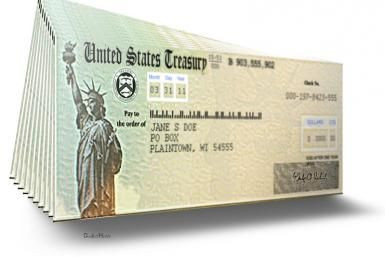CARES Act Business Tax Changes

Along with establishing the Payroll Protection Program loans, the CARES Act includes several changes affecting businesses' corporate taxes in 2020.
Payroll Tax Changes
Employers may receive a 50% tax credit for wages paid to employees between March 13, 2020 and December 31, 2020. The maximum credit per employee is $5,000, a 50% credit on the first $10,000 of each employee's wages.
Businesses are eligible to claim this credit based on one of the following two reasons:
- The employer's business is fully or partially suspended by government order due to COVID-19 during the calendar quarter; or
- The employer's gross receipts are below 50% of the comparable quarter in 2019.
For businesses with 100 employees or more, the credit can only be applied to employees not able to do their job due to a business suspension or a lack of business. Additionally, businesses that receive a loan through the Paycheck Protection Program are not eligible to claim this credit. Note that this credit in the CARES Act is unrelated to, and has no impact on, the credit from the Families First Coronavirus Response Act, which allows a credit to offset employer-paid family and sick leave related to the coronavirus.
Additionally, businesses may elect to defer payment of the employer's portion of the 6.2% Social Security tax for any deposits not made as of March 27, 2020 through the rest of the year. It is important to note that this is merely a deferral of payment and should not be considered as an amount forgiven. Half of the amount deferred will be due on December 31, 2021 and the second half will be due on December 31, 2022. Employers may not delay the Social Security tax deposit if they receive a Paycheck Protection Loan to maintain payroll.
Student Loans
Most employers now have the option to contribute up to $5,250 to employee student loans on a tax-free basis through the remainder of 2020. This amount can be paid directly to the employee or to a lender, as long as it is used for a qualified higher education loan. The payment can be applied to either interest or principal on the loan.
Key stipulations of the new law are as follows:
- The payments must be for a student loan incurred for the education of the employee (i.e., payments may not be for an employee's child or spouse's student loans); and
- The rules for education-assistance programs under Section 127 will apply. For instance, an employer must adopt a written plan describing the benefit and communicate the terms of the program to eligible employees. The program cannot favor highly compensated employees.
Net Operating Losses
With the passage of the Tax Cuts and Jobs Act in December 2017 came two key changes related to net operating losses (NOLs): (1) NOL carrybacks were eliminated but they were allowed to be carried forward indefinitely, and (2) only 80% of an NOL could be used to offset taxable income in 2018 and going forward. Now, in an effort to assist businesses, the CARES Act permits NOLs from 2018, 2019, and 2020 to be carried back five years from the year of such loss. Additionally, the 80% limitation has been removed for tax years before 2021.
Because of additional factors such as the qualified business income deduction and global intangible low taxed income, an evaluation should be undertaken before deciding whether it is worth amending any impacted tax returns. A lost QBI deduction could potentially negate any benefit from carrying back an NOL, or utilizing additional NOL in a given year, thereby making this change moot from a tax liability perspective, but expensive from a tax preparation stance.
Qualified Improvement Property
A peculiarity of the 2017 Tax Cuts and Jobs Act was the unintentional treatment of Qualified Improvement Property (QIP) as 39-year property as opposed to having a 15-year recovery period as expected. This negated the possibility of writing off qualified leasehold improvements, qualified retail improvements, and qualified restaurant property through bonus depreciation. Now with the passing of the CARES Act, this oversight has been corrected. Additionally, this correction is being applied retroactively, giving businesses the opportunity to amend prior year returns and take bonus depreciation on property that had begun to be depreciated over 39 years. A careful analysis with your accountant should be undertaken in order to determine the advantages or disadvantages of amending any return.
Peter N. Riefstahl is a supervisor at Louis T. Roth & Co., PLLC, a Louisville, KY-based Certified Public Accounting firm that specializes in tax planning, accounting, and business consulting services.
© Copyright IBTimes 2025. All rights reserved.





















